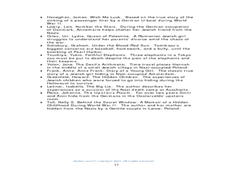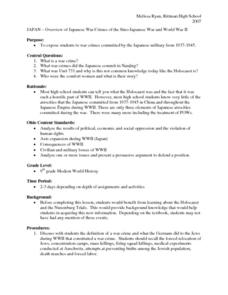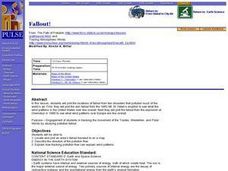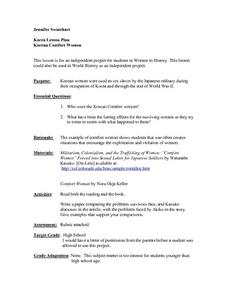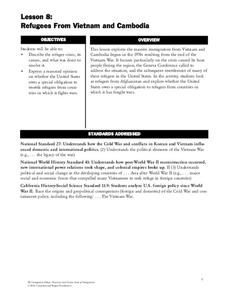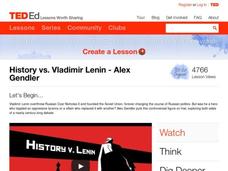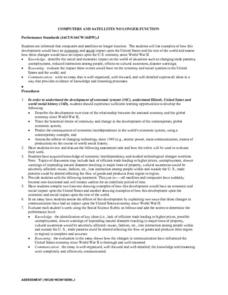Curated OER
The Children of World War II
Students examine the lives of children during WWII. In this WWII activity, students investigate the effects of the war on children, what life was like on and off the battlefield and how the geography influenced decisions. Students also...
Curated OER
Raising Voices: World War II in a Song
Twelfth graders discover the different ways Canada and Quebec participated in World War II. They then analyze the repercussions of the war on Quebec. Students complete three knowledge outcomes: Knowledge of facts, ( Canada's...
Curated OER
Overview of Japanese War Crimes of the Sino-japanese War And World War Ii
Ninth graders discuss the definition of a war crime and what the Germans did to the Jews during WWII that constituted a war crime. The analyze the results of political, economic, and social oppression and the violation of human rights.
Curated OER
Constitutional Issues: Civil Liberties During War
Learners discuss democratic ideals and constitutional principles. They decide which side of the issue they are on dealing with the placement of Japanese-Americans in camps during World War II. They examine primary source documents for...
Curated OER
Fallout
Students view a short film about the results of dropping the atomic bomb at the end of World War II. They research controversies surrounding the use of the bomb and nuclear weapons. They write two editorials about the issue.
Curated OER
Korean Comfort Women
Students examine the use of women as slaves by the Japanese military during World War II. Using the internet, they research the purpose of Korean comfort women and identify how the women have dealt with the exploitation. They share...
Curated OER
The End of United States' Occupation of Japan
Ninth graders examine and discuss reasons for end of U.S. occupation of Japan in 1952, locate surrounding Asian countries on map, explore changes to Japan after World War II, and discuss how changes in Japan impacted other countries.
Curated OER
The Treaty of Versailles: June 1919
There were four key players involved with the Treaty of Versailles. Present information and critical thinking questions regarding Woodrow Wilson, David Lloyd-George, Georges Clemenceau, and Vittorio Orlando. Included also are lists of...
Curated OER
The Diary of Anne Frank: Research Project on Concentration Camps during World War II
Eighth graders investigate the Holocaust and the persecution of specific ethnic groups in Europe during World War II.
Curated OER
Hidden Children
Eleventh graders explore, analyze and study a specific genocidal event in twentieth-century history, The Holocaust. They evaluate a variety of historical artifacts and synthesize the information gathered into their own in order to...
Curated OER
Patriotism Reflected in Art and Literature (part A)
Students explore pre-World War II Japanese art. In this patriotism activity, students analyze Eternal Fuji and Red Sun by Yokoyama Taikan. Students discuss the techniques used to create the painting as well as the symbolism behind it....
Curated OER
Multiple Perspectives on the Korean War
Learners interpret historical evidence presented in primary and secondary resources. In this Korean War lesson, students examine and analyze primary sources regarding U.S. involvement in the Korean War.
Franklin D. Roosevelt Presidential Library & Museum
Pearl Harbor Activity #1: Newspaper or Radio Account
After listening to President Franklin D. Roosevelt's "Day of Infamy" speech, young historians research information about the Japanese attack on Pearl Harbor, possible motives for the attack, and the consequences of the attack. Scholars...
Constitutional Rights Foundation
Refugees From Vietnam and Cambodia
The United States may have pulled its troops from the Vietnam War in 1973, but the conflict was far from over for the citizens living in Asia at the time. An informative resource lets learners know about the wave of over 220,000...
Curated OER
The Decision to Americanize the War in Vietnam
Students research the major events of the Vietnam War and construct a timeline. They do the same with the presidency of Lyndon B. Johnson or the 1960's. They act as an advisor to President Johnson to recommend a course of action...
John F. Kennedy Presidential Library & Museum
Military Advisers in Vietnam: 1963
How did the beginning of the Vietnam War factor into the Cold War with the Soviet Union? As part of a study of American involvement in Vietnam, class members read a letter address to President Kennedy and his response in which...
Curated OER
Children at War
Students conduct Internet research to investigate the use of children in combat throughout the world. Students read personal testimonies and analyze media coverage of children in combat.
US Holocaust Museum
Deconstrucing the Familiar
Collaboration and complicity. Class members examine a series of photographs and consider how active participation and passive complicity represented in the photos contributed to the Holocaust.
Curated OER
Writing A Foreign Policy
Students write a modified "foreign policy" between their own high school and a rival school in the conference. They describe the significance of a foreign policy from the World War II era.
Facing History and Ourselves
The Holocaust: Bystanders and Upstanders
Scholars analyze the role of bystanders during the Holocaust. The investigation explores the roles of the bystanders, upstanders, and rescuers with primary and secondary resources to determine actions taken—or not—and their implications...
TED-Ed
History vs. Vladimir Lenin
Vladimir Lenin is on trial in an engaging, animated video where the merits and consequences of the formation of the Soviet Union and Lenin's actions are reviewed. This is a great way to illustrate how to establish and argue unique...
Curated OER
Children at War
Students examine human rights by taking a closer look at children in combat. In this human rights lesson, students discuss the reasons that children have been used to fight wars throughout history and today. Students analyze the...
Curated OER
The Marshall Plan And The Reconstruction Of Europe
Third graders investigate various aspects that are associated with the history of Maryland. They look at the establishment of America as becoming a superpower. They conduct research using the text provided. The students gather the...
Curated OER
Computers and Satellites No Longer Function
They describe the development over time of the relationship between the national economy and the global economy since World War II. They trace the historical forces of continuity and change in the development of the contemporary global...


